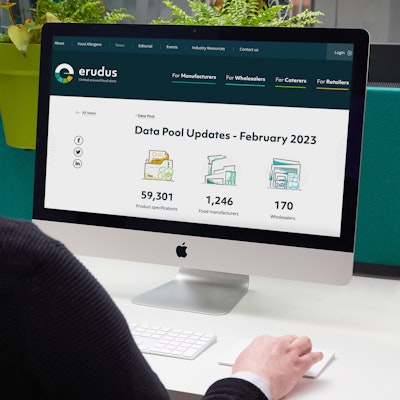A Collaborative Approach to Data, The Solution for the Food Industry

The foodservice sector is on the precipice of a data revolution – and now is the time for everyone in the supply chain to pool resources for the greater good of the industry, says Jon Shayler
Product data has been a hot topic in foodservice and the wider food industry for some time now, but we need to look beyond regulation compliance and consider how data can streamline and improve the wider industry.
Gathering quality product specifications has been a challenge long before the introduction of the FIC 1169/2011 regulations in December 2014. The immediate concern back then was gathering adequate information to prepare for the incoming legislation. But now that the industry is fairly well accustomed to the tighter regulations, we should be joining forces to streamline the process and begin to look towards other uses for the data.
If, rather than working in silos, all corners of foodservice came together to create an industry solution, we could collectively benefit from squeezing as much value out of product data as possible. Take the sheer amount of time wasted in collating product information as an example of where we should be looking to improve. If suppliers were encouraged to provide all of their data to single data pool source, it would steamline the process of gathering product specifications for everyone.
There are currently 45 wholesalers subscribed to our data pool, which might not seem like a lot at first glance. But think about the number of enquiries they’re collectively making. If, for example, each wholesaler stocked product lines from 300 suppliers, and request just one product specification from each every year – that’s 13,500 separate individual requests that have to be made.
In the interest of accuracy, you would hope those requests for information are made on a monthly basis – that brings us up to more than 160,000 separate annual requests.
Now think about the time that goes into those requests – just two minutes spent on each enquiry to each supplier equates to more than 5,400 working hours a year.
If you apply these rough numbers to the 400-plus food wholesalers/foodservice companies in the UK, it’s easy to see that there’s an enormous waste of time occurring every year – more than 1.4 million requests and 48,000 hours of time a year.
This doesn’t even take into account the countless hours wholesalers will spend in addition processing and passing this information on to caterers.
Imagine how much more time and effort would be saved by suppliers and wholesalers if there was a single solution in place for everyone to get their information from.
In developing Erudus, the biggest challenge we face is gathering reliable, accurate product information. To date, we’ve compiled comprehensive information on almost 29,000 products from 1,173 suppliers, much of it through individually contacting suppliers to gather their data.
The fact that we’ve got so many suppliers already contributing indicates the value of being open about their data, and we’re increasingly hearing about how supplying their data is paying dividends in terms of the amount of time and effort saved.
One of the key developments we had in improving the system was developing an API, or application-programming interface, which allows manufacturers to push information directly to Erudus from their own IT systems. It’s given us a pipeline of accurate data direct from the source, allowing 100 percent mitigation from any human errors experienced when inputting data.
Imagine how much more time and effort would be saved by suppliers and wholesalers if there was a single solution in place for everyone to get their information from.
By streamlining the process, we no longer have to hassle manufacturers for up-to-date information. Instead, it comes straight to us automatically, allowing a convenient way of securing up-to-date, accurate product data.
We’ve already consulted heavily with the wholesale sector, and had some great feedback on potential new functions and uses for the data we hold, which we’re currently working on. We’re now looking to reach out to wholesalers to learn more about how else data can be used to improve their everyday operations.
We’re not the only ones who have been gathering and consolidating product specifications – and had the industry been working together, we could have avoided this duplication of workload, instead focusing efforts on developing other uses for the data.
It’s madness that there hasn’t been more effort to share resources and intelligence. Collectively, the industry would benefit from more manufacturers realising the benefits of sharing their product data with data pools.
As Erudus has gathered more interest from the wider industry over time, we’ve heard from more and more people who share this vision.
We hosted a workshop recently and the feedback we had from senior figures from across the industry was overwhelming. There’s an incredible appetite from wholesalers for a single data pool to draw from, but it now needs more wholesalers and manufacturers to get behind it if its going to work.
We need to take a more collaborative approach to data handling and work together to come up with an industry-wide solution that works for everyone.


